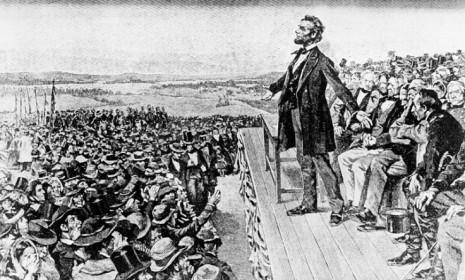The Gettysburg Address turns 149: Listen to Abraham Lincoln's legendary speech
On the 149th anniversary of the speech, listen to a dramatic reading by Americans including Sam Waterston, Matthew Broderick, and Ken Burns

A free daily email with the biggest news stories of the day – and the best features from TheWeek.com
You are now subscribed
Your newsletter sign-up was successful
149 years ago — or, perhaps more appropriately, seven score and nine years ago today — President Abraham Lincoln dedicated the Soldiers' National Cemetery in a speech that has since become known as the Gettysburg Address. Though Lincoln did not headline the dedication of Gettysburg, his brief remarks were so beautifully stated that the event's featured speaker, celebrated orator Edward Everett, wrote Lincoln the following day and said, "I should be glad, if I could flatter myself that I came as near to the central idea of the occasion, in two hours, as you did in two minutes." Lincoln's speech, which commemorates the Civil War's casualties and defends the justness of their cause, is now commonly held up as one of the greatest speeches in the English language. Here, listen to the Gettysburg Address, recited by Americans including Ken Burns, Sam Waterston, Matthew Broderick, and Medal of Honor recipient Paul. W. Bucha:

Read the Gettysburg Address:
Four score and seven years ago our fathers brought forth on this continent a new nation, conceived in Liberty, and dedicated to the proposition that all men are created equal.
The Week
Escape your echo chamber. Get the facts behind the news, plus analysis from multiple perspectives.

Sign up for The Week's Free Newsletters
From our morning news briefing to a weekly Good News Newsletter, get the best of The Week delivered directly to your inbox.
From our morning news briefing to a weekly Good News Newsletter, get the best of The Week delivered directly to your inbox.
Now we are engaged in a great civil war, testing whether that nation or any nation so conceived and so dedicated, can long endure. We are met on a great battle-field of that war. We have come to dedicate a portion of that field, as a final resting place for those who here gave their lives that that nation might live. It is altogether fitting and proper that we should do this.
But, in a larger sense, we can not dedicate—we can not consecrate—we can not hallow—this ground. The brave men, living and dead, who struggled here, have consecrated it, far above our poor power to add or detract. The world will little note, nor long remember what we say here, but it can never forget what they did here. It is for us the living, rather, to be dedicated here to the unfinished work which they who fought here have thus far so nobly advanced. It is rather for us to be here dedicated to the great task remaining before us—that from these honored dead we take increased devotion to that cause for which they gave the last full measure of devotion—that we here highly resolve that these dead shall not have died in vain—that this nation, under God, shall have a new birth of freedom—and that government of the people, by the people, for the people, shall not perish from the earth.
(via The Encyclopedia Britannica)
A free daily email with the biggest news stories of the day – and the best features from TheWeek.com
-
 Palantir's growing influence in the British state
Palantir's growing influence in the British stateThe Explainer Despite winning a £240m MoD contract, the tech company’s links to Peter Mandelson and the UK’s over-reliance on US tech have caused widespread concern
-
 Quiz of The Week: 7 – 13 February
Quiz of The Week: 7 – 13 FebruaryQuiz Have you been paying attention to The Week’s news?
-
 Nordic combined: the Winter Olympics sport that bars women
Nordic combined: the Winter Olympics sport that bars womenIn The Spotlight Female athletes excluded from participation in demanding double-discipline events at Milano-Cortina